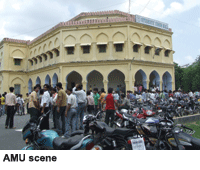The suspension on February 10 of Dr. Shrinivas Ramachandra Siras, chairman of the Modern Indian Languages department of Aligarh Muslim University (AMU), on charges of “gross misconduct” has provoked a wide open split between the faculty and students of AMU, established by the legendary Muslim scholar Sir Syed Ahmed Khan in 1857.
Siras (64), a few months shy of his retirement, was suspended after a video clip of him engaged in consensual sex with another man, was sent to vice chancellor P. K. Abdul Azis. “Is being homosexual a crime? This is a conspiracy as I have not hidden my sexual orientation from the university authorities during the past 22 years that I have served AMU,” says Siras.
 It’s an indicator of the extent to which judicial decisions influence public opinion that even in a non-metro town such as Aligarh (pop.667,000), public opinion is divided on an issue which until a few years ago, would have attracted universal condemnation. On July 3, last year, a division bench of the Delhi high court struck down s. 377 of the Indian Penal Code, 1860 which prescribes jail terms and fines for those having “carnal intercourse against the order of nature”. The 105 page judgement inter alia stated: “We declare that s. 377 of IPC, insofar as it criminalises consensual sexual acts of adults in private, is violative of Articles 21 (right to protection of life and personal liberty), 14 (right to equality before law) and 15 (prohibition of discrimination on grounds of religion, race, caste, sex or place of birth) of the Constitution. We hold that sexual orientation is a ground analogous to sex, and that discrimination on sexual orientation is not permitted under Article 15.”
It’s an indicator of the extent to which judicial decisions influence public opinion that even in a non-metro town such as Aligarh (pop.667,000), public opinion is divided on an issue which until a few years ago, would have attracted universal condemnation. On July 3, last year, a division bench of the Delhi high court struck down s. 377 of the Indian Penal Code, 1860 which prescribes jail terms and fines for those having “carnal intercourse against the order of nature”. The 105 page judgement inter alia stated: “We declare that s. 377 of IPC, insofar as it criminalises consensual sexual acts of adults in private, is violative of Articles 21 (right to protection of life and personal liberty), 14 (right to equality before law) and 15 (prohibition of discrimination on grounds of religion, race, caste, sex or place of birth) of the Constitution. We hold that sexual orientation is a ground analogous to sex, and that discrimination on sexual orientation is not permitted under Article 15.”
.gif) But in an interview given to the Hindustan Times (February 22), vice chancellor Abdul Azis was defiant. “Would anybody like his child to be gay or lesbian? AMU like any other educational institution, has its own tradition of moral values and we cannot allow the campus to be a cradle of wanton behaviour like homosexuality. I had to take preliminary action on the matter, otherwise it would have sent out a very wrong message. The professor’s act cannot be defended terming it as a private affair. The act was committed not in a private house but in the house allotted to him by the university and on the university campus.”
But in an interview given to the Hindustan Times (February 22), vice chancellor Abdul Azis was defiant. “Would anybody like his child to be gay or lesbian? AMU like any other educational institution, has its own tradition of moral values and we cannot allow the campus to be a cradle of wanton behaviour like homosexuality. I had to take preliminary action on the matter, otherwise it would have sent out a very wrong message. The professor’s act cannot be defended terming it as a private affair. The act was committed not in a private house but in the house allotted to him by the university and on the university campus.”
Generation Next — particularly student activists — tends to be less indignant. A five member facts-finding committee comprising activists of the Association for Advocacy and Legal Initiatives (AALI), Lucknow; the Alternative Law Forum, Bangalore; and the Saheli Women Resource Centre, New Delhi, has gone on record to say that the legal acts of the professor outside the confines of the classroom were not a matter of public concern. “We demand that FIRs first be registered against university officials and those who barged into Siras’ home without his permission and filmed him in his bedroom,” says Avantika Srivastava of AALI.
“Crimes have been committed by others; those who entered Siras’ house without permission, violated his privacy and the university which has fired him for an act that isn’t a crime by law. This professor hasn’t been fired for anything he’s done at his place of work. What he does at home has no relevance to his working life,” adds Saleem Kidwai, a second year B.Sc student of AMU.
So far there’s no clarity about who actually outed Siras. According to campus rumours, it was the handiwork of some disgruntled students who connived with the university authorities to film him with help from a local television channel. Also, the fact that Siras’ partner was a down-market rickshaw puller, has been repeatedly stressed to add to the gravity of the alleged ‘crime’.
Although taken aback by the strong student reaction, Azis is determined to conduct a thorough inquiry. “The professor will have all chances of representing himself before the inquiry committee, and he can access all legal options. But we will not allow the university’s reputation to be tarnished,” he says.
Perhaps AMU’s vice chancellor needs to wise up about the reality that the reputations of universities are established by high teaching-learning and research standards. Not by the private lives of faculty or students.
Vidya Pandit (Lucknow)